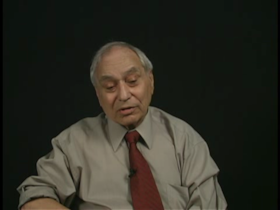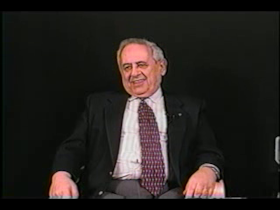Narrow Results By
Dawang, Elie - Oral History of a Holocaust Survivor
https://www.cjhn.ca/link/cjhn60321
- Collection
- WITNESS TO HISTORY COLLECTION (MHMC-02)
- Description Level
- Item
- Material Type
- moving images
- Physical Description
- 03:55:00
- Collection
- WITNESS TO HISTORY COLLECTION (MHMC-02)
- Description Level
- Item
- Material Type
- moving images
- Physical Description
- 03:55:00
- Language
- French
- Notes
- Elie Dawang was born on January 4, 1934 in Paris, France, to Lithuanian parents. Elie has good memories of his early childhood, being raised by loving and well-off parents. In May 1940, the Dawangs left Paris for a small village near the Spanish border. Despite the great danger, they went back to Paris to liquidate the business of Feivish, Elie’s father. The three of them were arrested in September 1941 and while Feivish managed to get Elie out of prison, he couldn’t do anything to save himself or his wife. They were both sentenced and sent to jail for possessing false papers. They both ended up in Auschwitz, but Elie’s mother was gassed upon arrival whereas Feivish survived the war. Meanwhile, Elie was being taken care of by a Jewish woman. Elie and his caretaker almost got arrested during the roundup of Vel d’Hiv but managed to hide. After a few months hiding in the suburbs of Paris, they moved to the country where they stayed until liberation. When Paris was liberated, they moved back there and Elie returned to school. He reunited with his father in May 1945. They moved to Canada in 1951 with Elie’s stepmother. Elie describes the process to immigrate, his first impressions of Montreal and Canada and his involvement in Holocaust education.
- Accession No.
- WTH-482
- Name Access
- Dawang, Elie
- Places
- Paris, France, Europe
- Archival / Genealogical
- Archival Descriptions
- Repository
- Montreal Holocaust Museum
Images
YouTube
Dawang, Elie - Oral History of a Holocaust Survivor
https://www.youtube.com/embed/f95UEOppbHESchryver, Samuel - Oral History of a Holocaust Survivor
https://www.cjhn.ca/link/cjhn67762
- Collection
- WITNESS TO HISTORY COLLECTION (MHMC-02)
- Description Level
- Item
- Material Type
- moving images
- Physical Description
- 02:32:52
- Collection
- WITNESS TO HISTORY COLLECTION (MHMC-02)
- Description Level
- Item
- Material Type
- moving images
- Physical Description
- 02:32:52
- Language
- English
- Notes
- Sam Schryver was born on May 7, 1922 in Amsterdam, Netherlands. Sam describes pre-war Amsterdam as the “most beautiful Jewish area ... so warm ... [the] most beautiful place to live for a Jew ... this is gone and will never, never come back." Sam went to public school, but also attended religious school where he learned Hebrew. He had a traditional Jewish upbringing.His father was on a committee to help clothe the poor; and the entire family belonged to various synagogues and Jewish organizations. Most of the Jews in Amsterdam were concentrated in the centre of the city. Sam explains that he never experienced any antisemitism growing up and that many of his close friends were non-Jews. The Germans entered Amsterdam in May 1940. The Dutch Nazis began to organize more openly. One night 150 Dutch Nazis approached the Jewish quarter of the city. They were met, however, by 1 500 Dutch gentiles who came to defend the Jews. One Dutch Nazi was killed in the skirmish. As a reprisal, the German Nazis rounded up 400 Jewish boys and took them to concentration camps, either Mauthausen or Buchenwald. The Jewish neighbourhood was demarcated and all Dutch, Jews and non-Jews, had to register with the Nazis. Sam was able to get a job at a hospital, allowing him to be exempted from work camp. In September/October 1942, his father was taken to a concentration camp. Sam joined the resistance - he obtained false I.D. and ration cards for fugitives. During the great raid of May 1943 the Germans emptied all the hospitals and senior's homes - all patients (including his mother) and hospital employees were thrown into trucks to be taken to concentration camps. Sam managed to survive the great raid by going into hiding in The Hague. He spent 18 months in an attic until he was discovered and taken to a gestapo jail, "The Orange Hotel," where he was held from January 22 to February 2, 1945. He was then taken to Westerbork concentration camp. At Westerbork he worked in a factory that recycled batteries. He escaped and was picked up by the Orange Brigade - the allies thought Westerbork was a German army camp and was going to bomb it. Due to Sam's intervention, they delayed the bombing and sent a reconnaissance mission which confirmed his report that this was actually a concentration camp. The Canadian forces liberated Westerbork. Sam immediately joined the armed forces and volunteered to guard the German soldiers. He was relieved of his duties on June 22, 1945. He returned to Amsterdam where he joined a Zionist organization. Sam found out his parents had both been killed in Sobibor. One sister survived. Then he travelled the country looking for "Hidden Children,” preparing them for Aliyah. He did this until the State of Israel was proclaimed in 1948. He went into the textile industry and got his B.A. in Holland. In 1954, Sam immigrated to Canada because he had been liberated by Canadian forces. He did not want to create a family after seeing what had happened to his parents. His girlfriend was persuasive, however, and they have been married for 42 years.
- Accession No.
- WTH-124-1
- Name Access
- Schryver, Samuel
- Archival / Genealogical
- Archival Descriptions
- Repository
- Montreal Holocaust Museum
Images
YouTube
Schryver, Samuel - Oral History of a Holocaust Survivor
https://www.youtube.com/embed/TlyPQlTpN2gSephardic Oral History Project interviews by Marie Berdugo-Cohen
https://www.cjhn.ca/link/cjhn78008
- Collection
- Canadian Jewish Congress organizational records
- Description Level
- SubSeries
- Material Type
- sound recording
- textual record
- Physical Description
- 28 sound elements. - Env. 0.01 metres of textual records.
- Fonds No.
- CJC0001; SA
- Date
- 1988.
- Scope and Content
- This fonds is composed of 23 interviews on 28 audio cassette tapes, accompanied by a thematic index. The Sephardic Jews interviewed for the project came from several different places: Egypt, Morocco, Algeria, Tunisia, Greece, Turkey, Iraq, Syria, Romania, and Israel. The interviews cover the subjec…
- Description Level
- SubSeries
- Material Type
- sound recording
- textual record
- Physical Description
- 28 sound elements. - Env. 0.01 metres of textual records.
- Scope and Content
- This fonds is composed of 23 interviews on 28 audio cassette tapes, accompanied by a thematic index. The Sephardic Jews interviewed for the project came from several different places: Egypt, Morocco, Algeria, Tunisia, Greece, Turkey, Iraq, Syria, Romania, and Israel. The interviews cover the subjects' early lives in North Africa and the Middle East and the difficulties the interviewees met with in their home country. They also speak of their adaptation experiences following immigration to Quebec. They discuss the importance of holding on to their religion in their community and in their lives, and also the ways in which they preserved their traditions.
- Date
- 1988.
- Fonds No.
- CJC0001
- Series No.
- SA
- History / Biographical
- The National Archives of the Canadian Jewish Congress (now called the Alex Dworkin Canadian Jewish Archives) aims to acquire and preserve documentation on the myriad facets of the Jewish presence in Canada and Quebec. It is in this light that the Archives of the Canadian Jewish Congress set up the project Oral History of the Sephardic community in February 1988. Marie Berdugo-Cohen was engaged to interview various people of the Sephardic Jewish community settled in Montreal and its surroundings. Mrs. Berdugo-Cohen was born in Morocco. After settling in Quebec, she co-wrote, with her daughter Yolande Cohen and with Yossi Levy, the book Juifs Marocains: Témoignages d'une immigration moderne, published in 1987. Mrs. Berdugo-Cohen passed away in Montreal in 1991.
- Custodial History
- This collection of interviews was created with the assistance of a grant from Employent and Immigration Canada in 1988.
- Notes
- Availability of other formats: As of February 2016 all of the interviews have been digitized as WAV and WMA files. Video clips have been made containing excerpts from some of the recordings (eg. Simone Harrosh, Meyer Benhaim).General note: After completing the digitization of this collection, a six minute audio montage was created featuring several of the interviewees speaking about their adaptation to life in Canada.
- Archival / Genealogical
- Archival Descriptions
- Repository
- Canadian Jewish Archives
YouTube
Sephardic Oral History Project interviews by Marie Berdugo-Cohen
https://www.youtube.com/embed/9wVcpSam_HsZablow, Lou - Oral History of a Holocaust Survivor
https://www.cjhn.ca/link/cjhn67776
- Collection
- WITNESS TO HISTORY COLLECTION (MHMC-02)
- Description Level
- Item
- Material Type
- moving images
- Physical Description
- 01:24:52
- Collection
- WITNESS TO HISTORY COLLECTION (MHMC-02)
- Description Level
- Item
- Material Type
- moving images
- Physical Description
- 01:24:52
- Language
- English
- Notes
- Lou Zablow was born on March 10, 1924 in Lodz, Poland. When he was 11, he joined a Zionist organization that prepared him to make Aliyah. As Germany invaded Poland, Lou’s father was drafted into the Polish army. On March 10, 1940, Lou and his mother were forced to move to the ghetto by three Germans. In the ghetto, Lou joined the Hanoar Hatzioni Zionist settlement. For almost one year, he worked in this agricultural settlement and went to school to prepare for making Aliyah. When Rumkowsky was asked to shut down all the Zionist settlements in the ghetto, Lou was in charge of caring for 35 orphans. For one year, he took care of their health and education. At that point, he was sent to work for a carpenter but, when people in charge of the ghetto learned he had an advanced level of education, he was transferred to do administrative work for several factories. Before being sent to Auschwitz, Lou and his fellow inmates were told by Biebow that they were going to be resettled in Germany. Lou stayed four days in Auschwitz where he evaded several selections before being sent to Lieberose, Sachenhausen, and Mauthausen concentration camps. In April 1945, he was forced on a death march to Gunskirchen concentration camp where he was liberated by the US army. Soon after his liberation, Lou became sick with typhus. He survived and started to work as an interpreter for the US army. He stayed in Linz until 1949 then moved to Montreal. It was so hard for him to make a living in Canada that he considered going back to Europe. Nonetheless, he persevered and managed to start a new life in his new country. Lou Zablow took part in the creation of the Montreal Holocaust Memorial Center.
- Accession No.
- WTH-424
- Name Access
- Zablow, Lou
- Places
- Lodz , Poland , Europe
- Archival / Genealogical
- Archival Descriptions
- Repository
- Montreal Holocaust Museum
Images
YouTube
Zablow, Lou - Oral History of a Holocaust Survivor
https://www.youtube.com/embed/OkxV0Hmu1lM
{{ server.message }}




